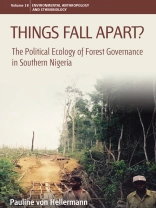Governance failure and corruption are increasingly identified as key causes of tropical deforestation. In Nigeria’s Edo State, once the showcase of scientific forestry in West Africa, large-scale forest conversion and the virtual depletion of timber stocks are invariably attributed to recent failures in forest management, and are seen as yet another instance of how “things fall apart” in Nigeria. Through an in-depth historical and ethnographic study of forestry in Edo State, this book challenges this routine linking of political and ecological crisis narratives. It shows that the roots of many of today’s problems lie in scientific forest management itself, rather than its recent abandonment, and moreover that many “illegal” local practices improve rather than reduce biodiversity and forest cover. The book therefore challenges preconceptions about contemporary Nigeria and highlights the need to reevaluate current understandings of what constitutes “good governance” in tropical forestry.
Innehållsförteckning
List of Maps
List of Figures
Acknowledgements
Introduction
Chapter 1. Ecology and Politics in the Benin Kingdom
Chapter 2. Separating Farm and Forest: Reservation and Dereservation
Chapter 3. Managing the Forests: Logging and Regeneration
Chapter 4. Reinventing Farm and Forest: The Changing Forms of Taungya Farming
Chapter 5. Okomu National Park: A Postscript on Conservation
Appendix: Administrative History of Edo State
Bibliography
Om författaren
Pauline von Hellermann is Lecturer in Anthropology at Goldsmiths, University of London. She has conducted research on landscapes and politics in Nigeria and Tanzania and is editor of Multisited Ethnography: Problems and Possibilities in the Translocation of Research Methods (with Simon Coleman, Routledge, 2011).












